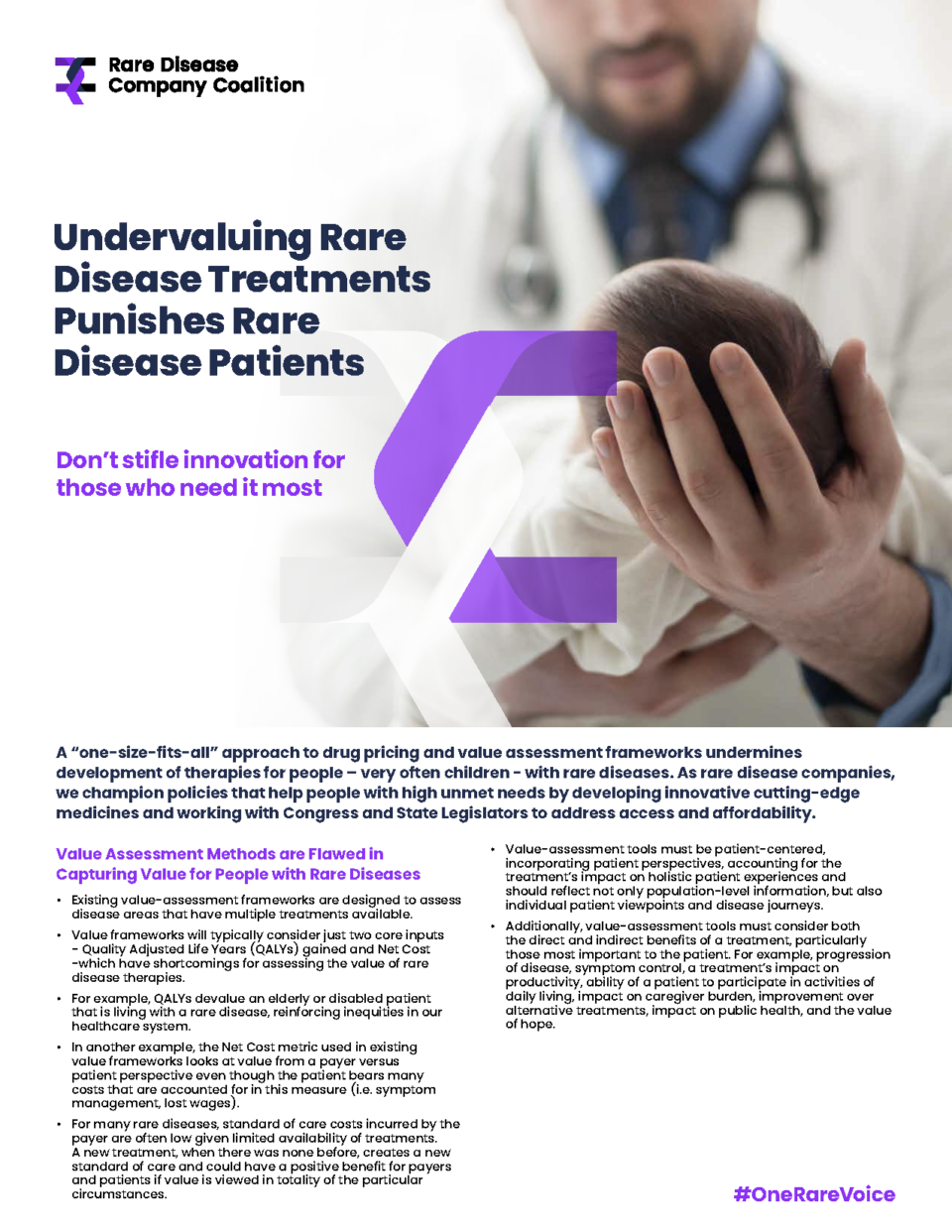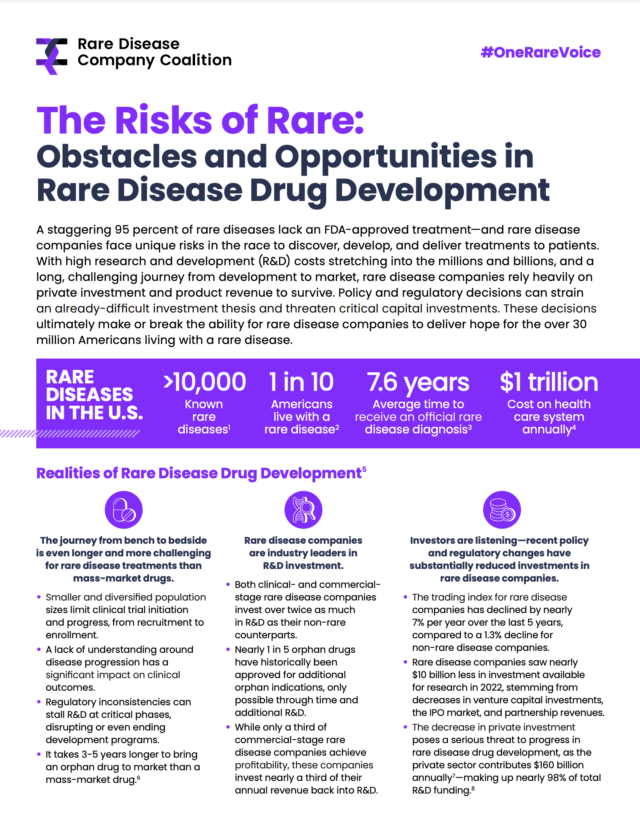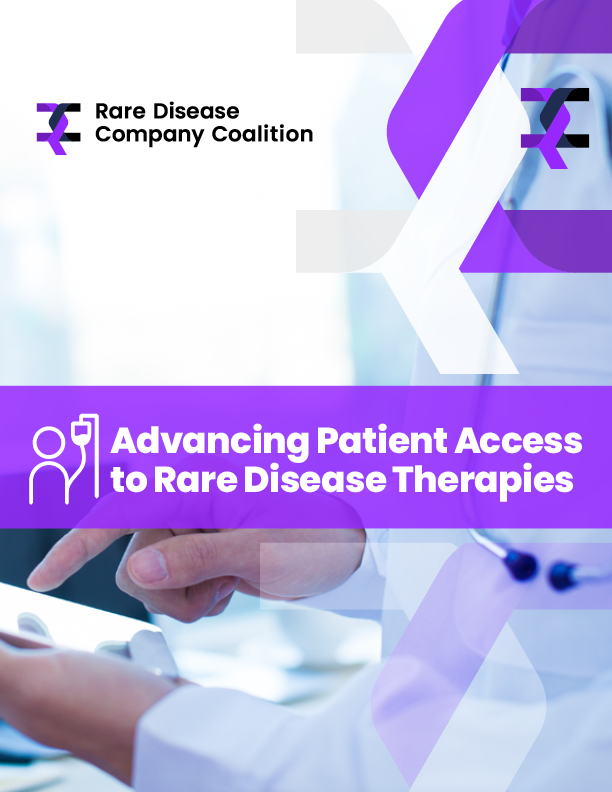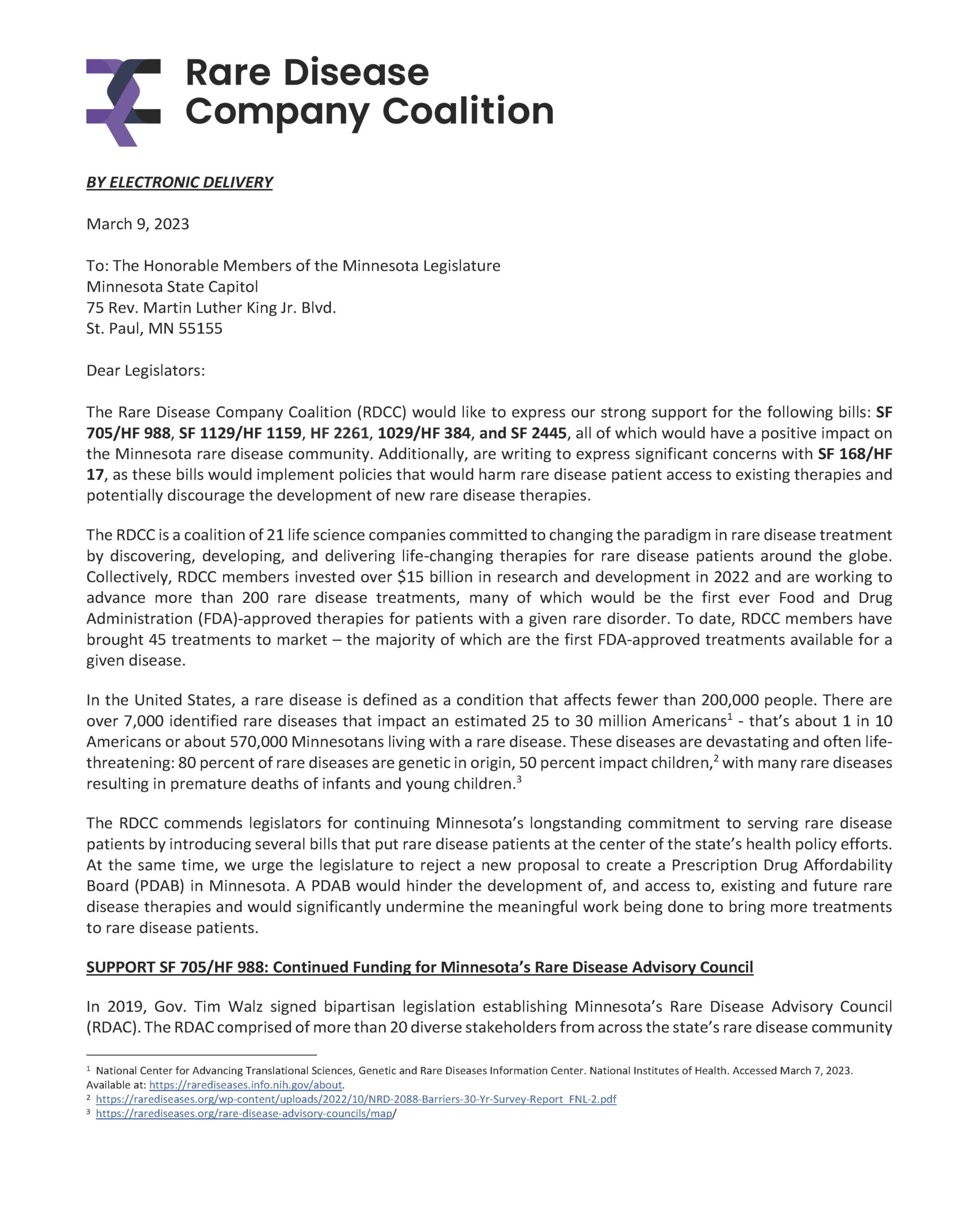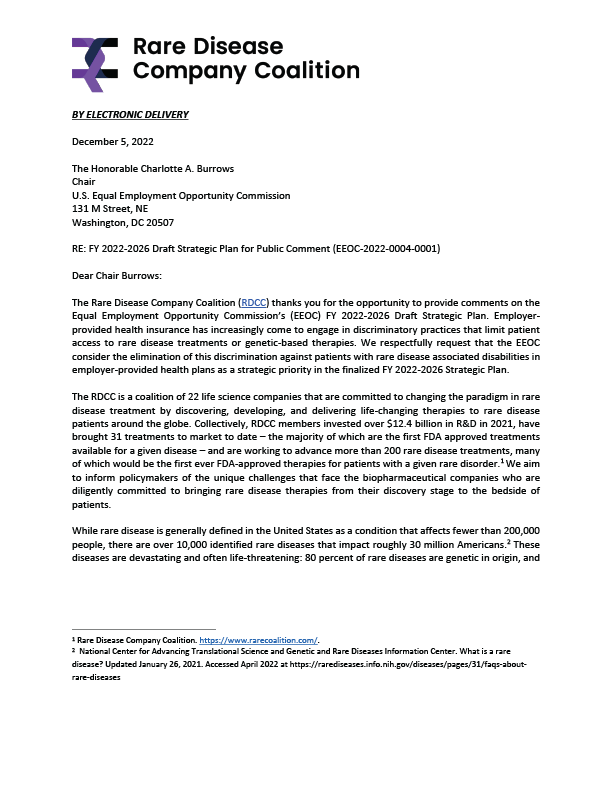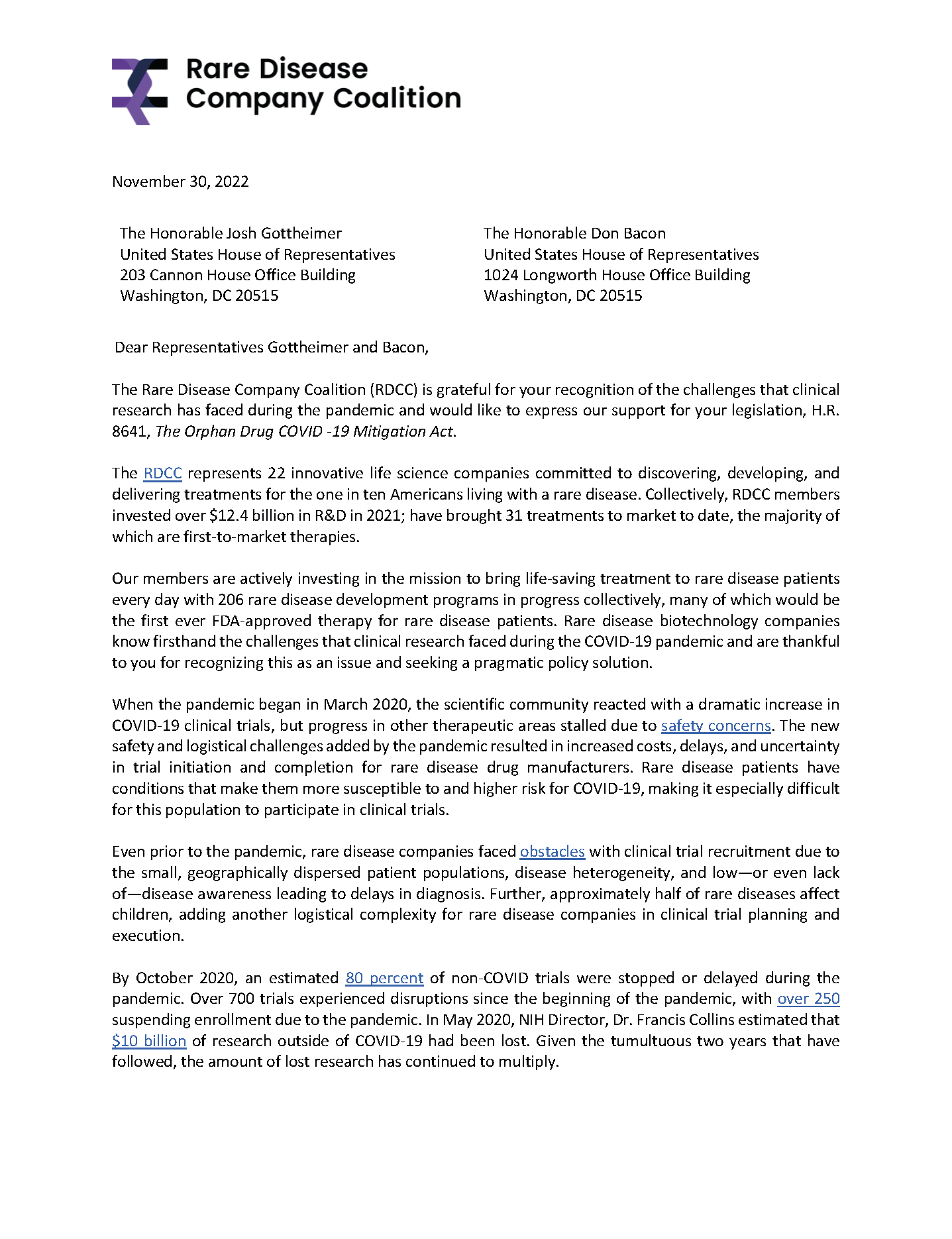Washington, D.C. – Last week, the Rare Disease Company Coalition (RDCC), on behalf of 29 leading rare disease biotech companies, sent a letter to Department of Health and Human Services Secretary Robert F. Kennedy Jr. and the Trump Administration. The RDCC called on the Administration to prioritize the urgent needs of the 30 million Americans affected by rare disease and support policies that increase innovation and access to life-changing treatments.
The RDCC offers the following policy recommendations to ensure the 1 in 10 Americans living with a rare disease have access to safe and effective therapies:
The RDCC is ready to serve as a resource to policymakers to create a brighter and healthier future for American families impacted by rare diseases.
Read the full letter below.
2024 will be a critical year for the rare disease community – with crucial policy challenges and opportunities, a competitive election cycle, and continued economic uncertainty, it is now more important than ever for the RDCC to be a fierce advocate for rare disease innovation and access.
Our 2024 Outlook contains ambitious goals to address concerns and opportunities within both pillars, and empowers the RDCC to harness the support and engagement of our member companies and broader rare disease community. With the partnership of champion policymakers, patient advocacy organizations, and key third-party stakeholders, we maintain our commitment to providing hope for the patients living with one of the 95 percent of rare diseases with no FDA-approved treatment.
Read our full outlook below.
Healthcare Capital Group Unveils White Paper Addressing Financial Risks and Policy Challenges Threatening the Future of Rare Disease Innovation
WASHINGTON, DC – (October 26, 2023) – On Wednesday, October 25, the Rare Disease Company Coalition (RDCC) hosted a congressional briefing on Capitol Hill. The briefing unveiled a new white paper, “Rare Disease Companies in the Public Markets: Challenging Performance Against a Backdrop of Policy Uncertainty.” The study analyzes the financial risks of rare disease drug development and examines the impact of policies and proposals on critical capital investment in rare disease research and development.
“Rare and non-rare are two different universes,” said Neal Masia, CEO of Health Capital Group and author of the new white paper. “There are a lot of policy risks fueling investor concerns.”
The event brought together the policy, patient advocacy, investor, and industry communities for a panel discussion on the significance of the recent decline in rare disease funding and the urgency of acting to protect and build upon the progress made over the past 40 years since the adoption of the Orphan Drug Act (ODA).
“Even the smallest shift in public policy can leave our loved ones with no hope for treatment,” said Dorothea Lantz, Director of Community Engagement at the Prader-Willi Syndrome Association. “As a rare disease community, we understand the costs and the risk of rare disease research and development.”
Panelists agreed that policy plays an integral role in incentivizing investment in rare disease R&D and that recent fluctuations have made it difficult for companies to access critical capital. The study highlights this struggle, demonstrating that the market value of rare disease companies declined by nearly 7% per year over the past five years, versus an annual decline of 1.3% for non-rare disease companies. If a more stable policy environment does not prevail, rare disease companies will continue struggling to survive.
“Investors are forward-looking. They are thinking about what the environment is going to look like 10 years from now, and they’re pretty good at connecting the dots,” said Ritu Baral, Managing Director, Senior Biotechnology Analyst at Cowen and Company. “And what can happen to turn this around? Incentives are needed to provide a buffer for current laws.”
Concerns about the policy environment have already impacted rare disease company valuations and access to capital. Rare disease companies saw nearly $10 billion less in investment available for research in 2022, stemming from decreases in venture capital investments, the IPO market, and partnership revenues. Venture capital investments in rare disease were down over 41% in 2022 and rare disease IPOs were down 81%, marking a substantial reduction of investment in rare disease companies. In a period of such financial uncertainty, seemingly small policies and proposals can have hugely consequential impacts on the ability for rare disease companies to discover, develop, and deliver potentially life-changing treatments to patients.
“Research and development is the only way that our families are going to have a chance at a normal life,” continued Lantz. “We are here to make our voices heard, not just for Prader-Willi Syndrome, but for the whole rare disease community. We hope policymakers are listening.”
Videos of Hill Briefing on October 25, 2023
A new white paper authored by Health Capital Group and sponsored by the Rare Disease Company Coalition considers the financial risks of rare disease drug development and how policy and regulatory changes can strain an already-difficult investment thesis. The study analyzed 700 publicly traded biopharmaceutical companies from mid-2018 to mid-2023 to better understand how rare disease companies and investors have been impacted by the shift in the policy environment over the past five years.
The data demonstrates that rare disease companies are struggling to survive in the current policy and funding ecosystems. Venture capital investments in rare disease were nearly halved in 2022 and rare disease IPOs were down by nearly 90%. Additionally, rare disease companies saw nearly $10 billion less in investment available for research in 2022, stemming from decreases in venture capital investments, the IPO market, and partnership revenues. Despite these challenges, rare disease companies continue to invest twice as much into research and development (R&D) as their non-rare counterparts. In a period of such financial uncertainty, seemingly small policies and proposals can have hugely consequential impacts on the ability for rare disease companies to discover, develop, and deliver potentially life-changing treatments to patients.
With 95% of over 10,000 rare diseases still lacking an FDA-approved treatment, policymakers must recognize the extraordinary unmet need for the 30 million Americans living with a rare disease. We urge policymakers to recognize the unique risks, challenges, and costs associated with rare disease drug development and support policies that promote innovation and R&D and enable access to rare disease treatments.
Read the full white paper titled, ‘Rare Disease Companies in the Public Markets: Challenging Performance Against a Backdrop of Policy Uncertainty’ here.
An overview can be found here.
The Rare Disease Company coalition (RDCC) is pleased to share this new resource for federal and state policymakers and regulators to help inform legislative actions that can bolster patient access to life-changing, FDA-approved rare disease therapies.
Today, over 95% of rare diseases lack an FDA-approved treatment, and while the FDA continues to add to the number approved therapies, treatments are only as valuable as they are accessible.
Once a rare disease treatment is approved by the FDA, patients seeking to benefit from the approved therapy are often faced with challenges to access due to complex interstate credentialing, limited coverage, delays in review, inaccurate value frameworks, and insufficient medical necessity determinations.
In this new resource, the RDCC outlines six areas for improvement with specific policy solutions that will improve outcomes for the rare disease community.
The RDCC sent a letter to Congress opposing recent policy proposals that undermine the intent of the accelerated approval pathway, and would limit patient access to life-saving treatments for rare disease patients. Any future policy reforms to accelerated approval should protect patient access, build upon Congress’ recent steps to boost FDA oversight of accelerated approval products, leverage and enhance its existing authorities, and protect the integrity of this critical pathway.
The RDCC calls on Congress to reject these proposals by:
For 30 years, the accelerated approval pathway has served as a critical lifeline for rare disease patients, leading to significant advances in the treatment of serious, life-threatening diseases. Congress and the FDA have regularly reaffirmed that medical products approved through the accelerated approval pathway meet the nation’s stringent standards for safety and effectiveness. The policy proposals currently being brought forward would upend past progress and prevent future discovery.
Click here to download and read the letter sent to Members of key Congressional committees.
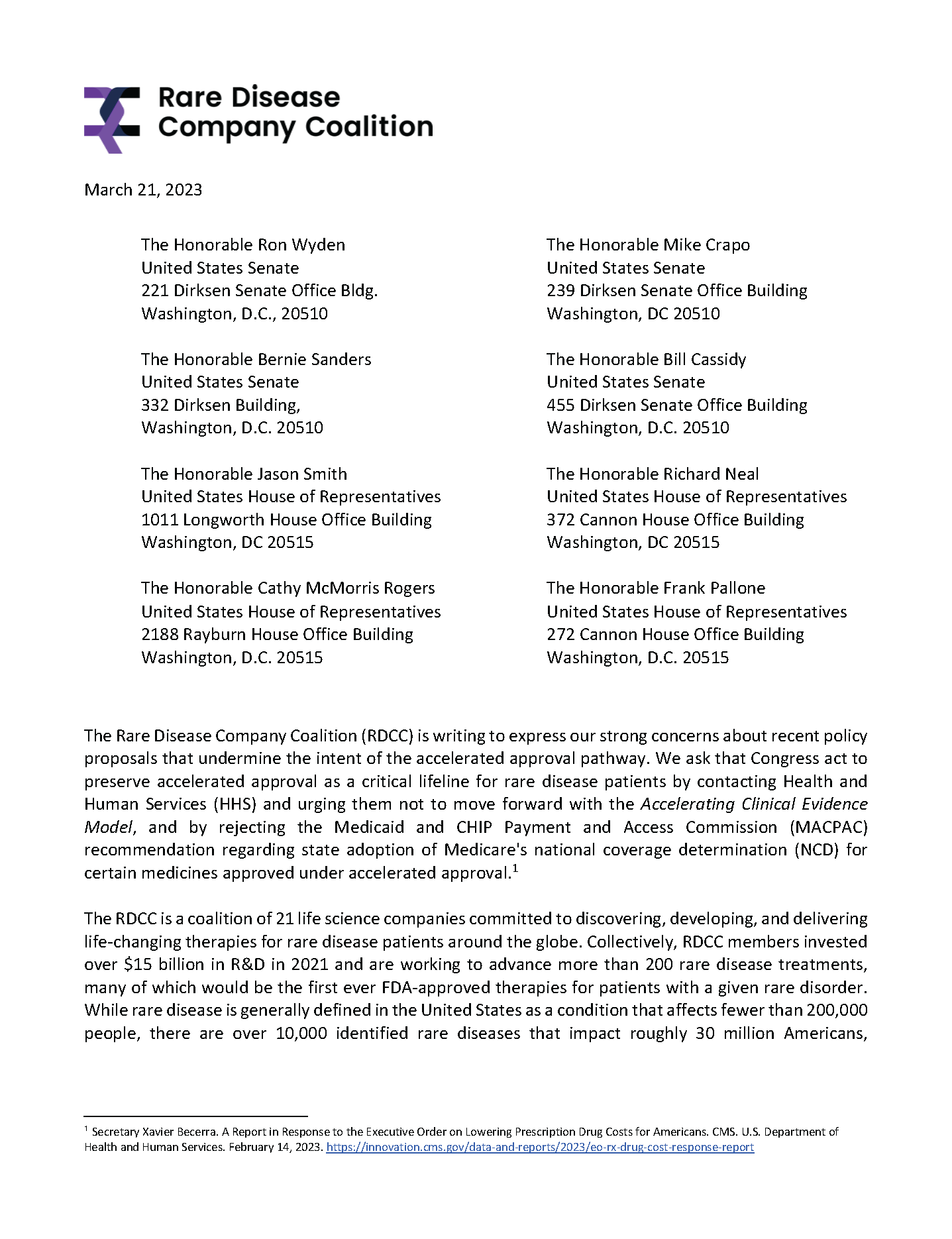
The RDCC has shared a letter with Minnesota State legislators in support of four new bills that have the potential to better the lives of those living with a rare disease. The work being done in Minnesota shows the important impact state-level policy can have on rare disease drug development, both in an individual state and beyond.
These four bills will have an immediate and lasting impact on Minnesotans facing a rare disease. At the same time, we urge the legislature to reject a new proposal to create a Prescription Drug Affordability Board (PDAB) in Minnesota. A PDAB would hinder the development of, and access to, existing and future rare disease therapies and would significantly undermine the meaningful work being done to bring more treatments to rare disease patients.
Click here to download and read the letter sent to the Members of the Minnesota Legislature.
RDCC member companies are commemorating the 40th anniversary of the Orphan Drug Act (ODA) by sharing how its policies have enabled their therapeutics to reach rare disease patients around the world who have had limited or no treatment options. For 40 years, the ODA has empowered biotech companies to invest in rare disease research and innovation that would otherwise be impractical or impossible to pursue.
Read how biotech companies have relied on incentives established by the ODA, like the Orphan Drug Tax Credit, to deliver new treatments for patients living with rare diseases like hyperoxaluria type 1 and acute hepatic porphyria, facioscapulohumeral muscular dystrophy, Batten disease, enzyme deficiency diseases, tumor-induced osteomalacia (TIO), X-linked hypophosphatemia (XLH), rare blood disorders including pediatric PK deficiency, thalassemia and sickle cell disease, and more. With 95% of rare diseases still lacking a treatment option today, policymakers should renew their commitment to protecting and building on the ODA to ensure continued innovation and investment.
Pushkal Garg, MD, Chief Medical Officer and EVP, Development & Medical Affairs of Alnylam Pharmaceuticals
“Alnylam has obtained 5 drug approvals in the past 5 years, of which 4 were for medicines which have been granted an Orphan Drug Designation. We believe the speed and agility with which we were able to bring these transformative medicines to patients who are living with some of the world’s rarest diseases, such as primary hyperoxaluria type 1 and acute hepatic porphyria, would not have been possible without the provisions of the Orphan Drug Act. The provisions of the Act, importantly those that offer financial incentives and marketing exclusivity are vital for innovative Companies like Alnylam who have made sizeable investments in rare disease drug development, thereby bringing novel therapeutics and hope to patients around the world who have had limited or no treatment options, while also allowing us to continue to invest in our R&D engine to fuel the discovery and development of future breakthroughs in medicine.”

Giacomo Chiesi, Head of Chiesi Global Rare Diseases
“The Orphan Drug Act created a framework whereby industry can focus on long-term investments in R&D, but there is much work to be done. Policymakers must understand that rare disease patients and families have unique needs. Working together for the unified purpose of delivering treatments for rare disease patients is a public health imperative.”

Santiago Arroyo, M.D., Ph.D. Chief Medical Officer, Fulcrum Therapeutics
“Time is precious for patients and families affected by rare diseases. Fulcrum is proud to have launched the first Phase 3 clinical trial for facioscapulohumeral muscular dystrophy (FSHD) – a devastating, progressive neuromuscular disease for which there are no approved treatments – less than three years after becoming a public company. The incentives provided by the Orphan Drug Tax Credit are essential for enabling young companies like ours to rapidly research and develop promising new therapies for the communities that are waiting.”

Nevan Charles Elam, JD, Chief Executive Officer & Founder, Rezolute Bio
“When you look beyond rare diseases that are currently being treated or have the potential for new therapies, you see millions of people who now have hope thanks to the ODA. While the disease may be rare, the people are not, and without the ODA, the incentive to research and develop new therapies for patients in need would simply not be there.”

Jean-Jacques Bienaime, Chairman and Chief Executive Officer at BioMarin
“The Orphan Drug Act (ODA) makes it possible for us to invest in the research and development necessary to address the unmet needs of rare disease patients. Since the passage of the ODA, all of BioMarin’s FDA-approved therapies have received orphan designation. As such, BioMarin has been able to transform the lives of children across the globe who have rare diseases such as CLN2 (a form of Batten disease) and enzyme deficiency diseases, among others.” By protecting the ODA, we are protecting the future of innovation and sustaining hope for children and adults alike with rare diseases.”

Camille Bedrosian, Chief Medical Officer, Ultragenyx
“The incentive provided by the Orphan Drug Tax Credit allowed Ultragenyx to study Crysvita® for tumor-induced osteomalacia (TIO), an ultra-rare disease that most companies would never have studied, after Ultragenyx previously obtained initial FDA approval of Crysvita® for the treatment of X-linked hypophosphatemia (XLH). We support the continued existence of the Orphan Drug Tax Credit as a critical incentive for rare disease companies.”

Del Lebel, Head, U.S. Government Affairs and Policy, Alexion, AstraZeneca Rare Disease
“The Orphan Drug Act spurred tremendous progress in the development of rare diseases treatments not only in the United States, but worldwide. The law has served as a catalyst for rare disease innovation and regulatory approval pathways in many other countries. Now is the time to build on that progress and promote sound policies that will improve patients’ lives.”

Ernesto Aycardi, Chief Development Officer and Head of Global Drug Development, Kyowa Kirin
“Kyowa Kirin is focused on advancing science and providing medicines for patients with unmet needs, and we consider Orphan Diseases an opportunity to accomplish our goals of serving the neediest. The ODA incentive programs have been crucial to our industry’s work – and we celebrate the profound impact they have had for patients living with rare diseases. Given the number of patients still in search of effective treatment options, we need collective action and appropriate programs to continue making a difference and foster innovation.”

Brian Goff, Chief Executive Officer at Agios Pharmaceuticals
On the 40th anniversary of the Orphan Drug Act, we celebrate the progress that has been made for hundreds of rare disease communities who previously had no treatment options. Since the legislation’s enactment in 1983, the number of FDA-approved medicines has grown from 38 to more than 650 – and that’s no coincidence. We also recognize that more progress is needed for the 95% of rare diseases that still lack treatment. Upholding and strengthening the provisions of the Orphan Drug Act fuel ongoing innovation on behalf of underserved communities, such as Agios’ clinical programs in rare blood disorders including pediatric PK deficiency, thalassemia and sickle cell disease.”

Jeffrey M. Dayno, M.D., Interim Chief Executive Officer, Harmony Biosciences
“The Orphan Drug Act catalyzed new hope and possibilities for the millions of people living with a rare disease who had not yet had their unmet medical needs addressed by an approved new treatment option. Thanks to the tireless efforts of patients and their advocates, we can now build upon 40 years of industry rare disease research, innovation, and therapeutic breakthroughs. Harmony Biosciences is privileged to continue this mission as we strive to bring hope to people living with rare neurological diseases – ensuring that patients remain at the heart of everything we do.”

Steven Pfanstiel, Chief Financial Officer, Marinus Pharmaceuticals
“As a company committed to the development of innovative treatments for patients with rare forms of epilepsy, the Orphan Drug Act (ODA) helped enable us to deliver a first-of-its-kind treatment option to the CDKL5 deficiency disorder community for an indication with no prior approved therapies. With four additional clinical programs underway or expected to begin in 2023 utilizing the same compound, the ODA is critical to ensuring we can continue to drive innovation for our underserved patient communities in need of new treatment options.”

Chris Morabito, M.D., Chief Medical Officer, Astria Therapeutics
“Astria’s mission to provide life-changing therapies for people affected by rare diseases is directly aligned with the goals of the Orphan Drug Act and the Orphan Drug Tax Credit (ODTC). The ODTC enables companies like ours to bring important medicines to patients more efficiently, and we are supportive of the preservation of this critical incentive for the drug development process.”

We appreciate the opportunity to provide comments on EEOC’s FY 2022-2026 Draft Strategic Plan and look forward to working together to end the discriminatory practices of employer-sponsored health plans, ensuring that rare disease patients have access to the treatments and therapies they desperately need.
It is vital that EEOC exert its proper authority within its jurisdiction to prevent employers from intentionally or unintentionally discriminating against rare disease patients based on their disabilities and, in so doing, preventing those patients from accessing the transformative treatments that have become available through decades of healthcare innovation.
When the pandemic began in March 2020, the scientific community reacted with a dramatic increase in COVID-19 clinical trials, but progress in other therapeutic areas stalled due to safety concerns. The new safety and logistical challenges added by the pandemic resulted in increased costs, delays, and uncertainty in trial initiation and completion for rare disease drug manufacturers. Rare disease patients have conditions that make them more susceptible to and higher risk for COVID-19, making it especially difficult for this population to participate in clinical trials.
By October 2020, an estimated 80 percent of non-COVID trials were stopped or delayed during the pandemic. Over 700 trials experienced disruptions since the beginning of the pandemic, with over 250 suspending enrollment due to the pandemic. In May 2020, NIH Director, Dr. Francis Collins estimated that $10 billion of research outside of COVID-19 had been lost. Given the tumultuous two years that have followed, the amount of lost research has continued to multiply.
Many of the companies investing in rare disease research are small biotechnology companies that face particularly stark financial challenges, leaving them with exceedingly difficult choices on whether to resume their trials or stay in business altogether. Much of the critically necessary rare disease clinical research remains stalled, while millions of patients are waiting for breakthrough treatments and cures for the diseases that threaten their lives.
The RDCC is grateful for the leadership of Representative Josh Gottheimer (D-NJ) and Representative Don Bacon (R-Neb) to co-sponsor Leo’s Law, formerly called The Orphan Drug COVID-19 Mitigation Act, and push for its inclusion in the next available legislative vehicle. Learn more on this important issue which will help to bring hope and needed cures to the at least 95 percent of rare diseases currently lacking an FDA-approved treatment in this letter.
Click here to download this overview.

The Rare Disease Company Coalition (RDCC) submitted comments on S. 4348, the Food and Drug Administration Safety and Landmark Advancements (FDASLA) Act of 2022. In a follow-up letter to the House Energy & Commerce (E&C) and Senate Health, Education, Labor, and Pensions (HELP) Committees, the RDCC writes to commend the work done to date while strongly encouraging the timely reauthorization of the user fees to ensure continuity of critical funding for the Food and Drug Administration. Timely action will avert a delay in the rare disease drug review process.
Please see here for the RDCC’s letter.
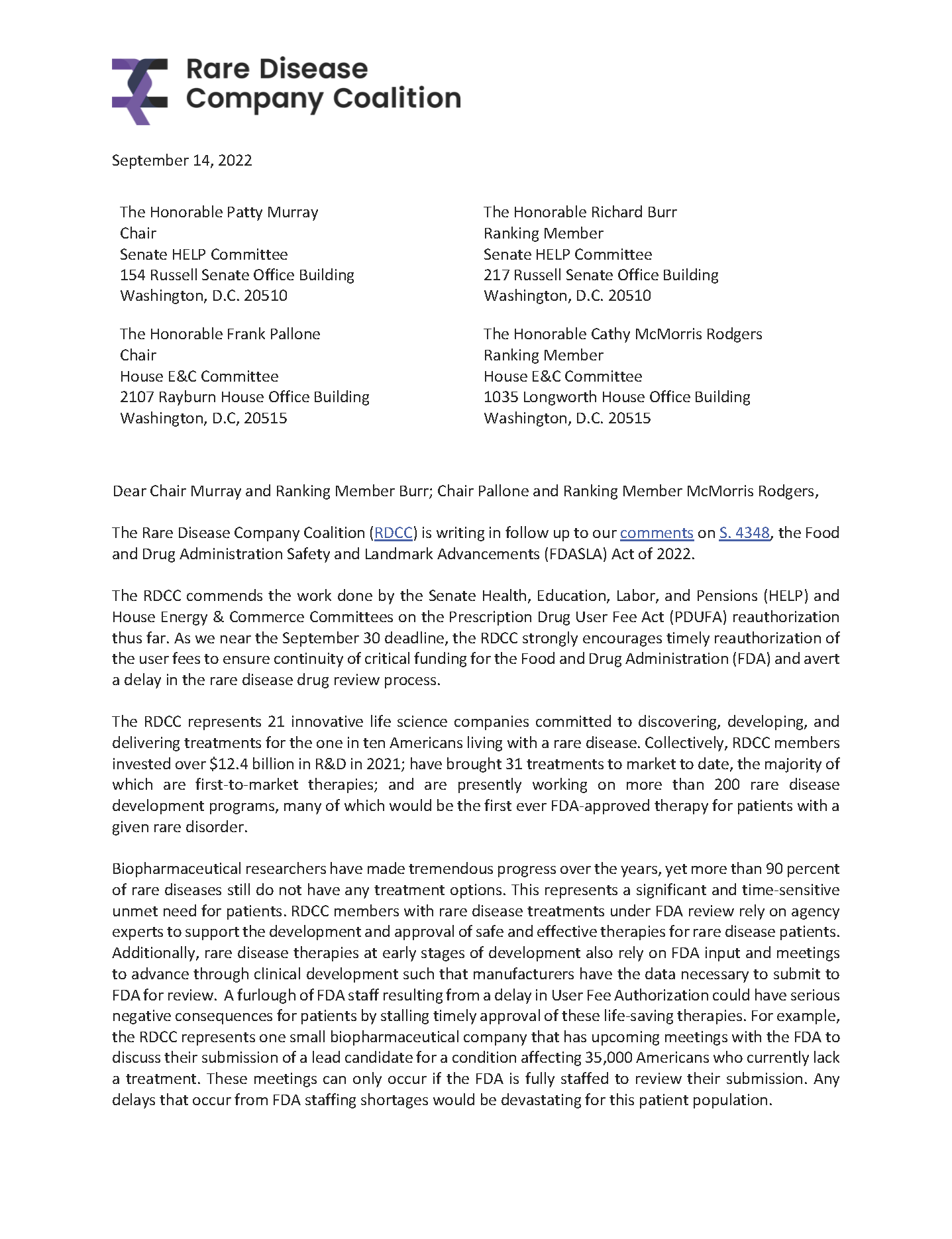
Newborn screening is a vital and proven public health program that screens approximately four million U.S. newborns each year. In the first 24 to 48 hours of a baby’s life, a small blood sample is taken to detect serious, often fatal, genetic conditions that can be treated if diagnosed early. We believe equitable access to newborn screening can ensure that all babies have the best chance for a healthy life. Join us in working towards a modern newborn screening system that provides equal access to a timely diagnosis for all babies.
Learn more in this educational resource.
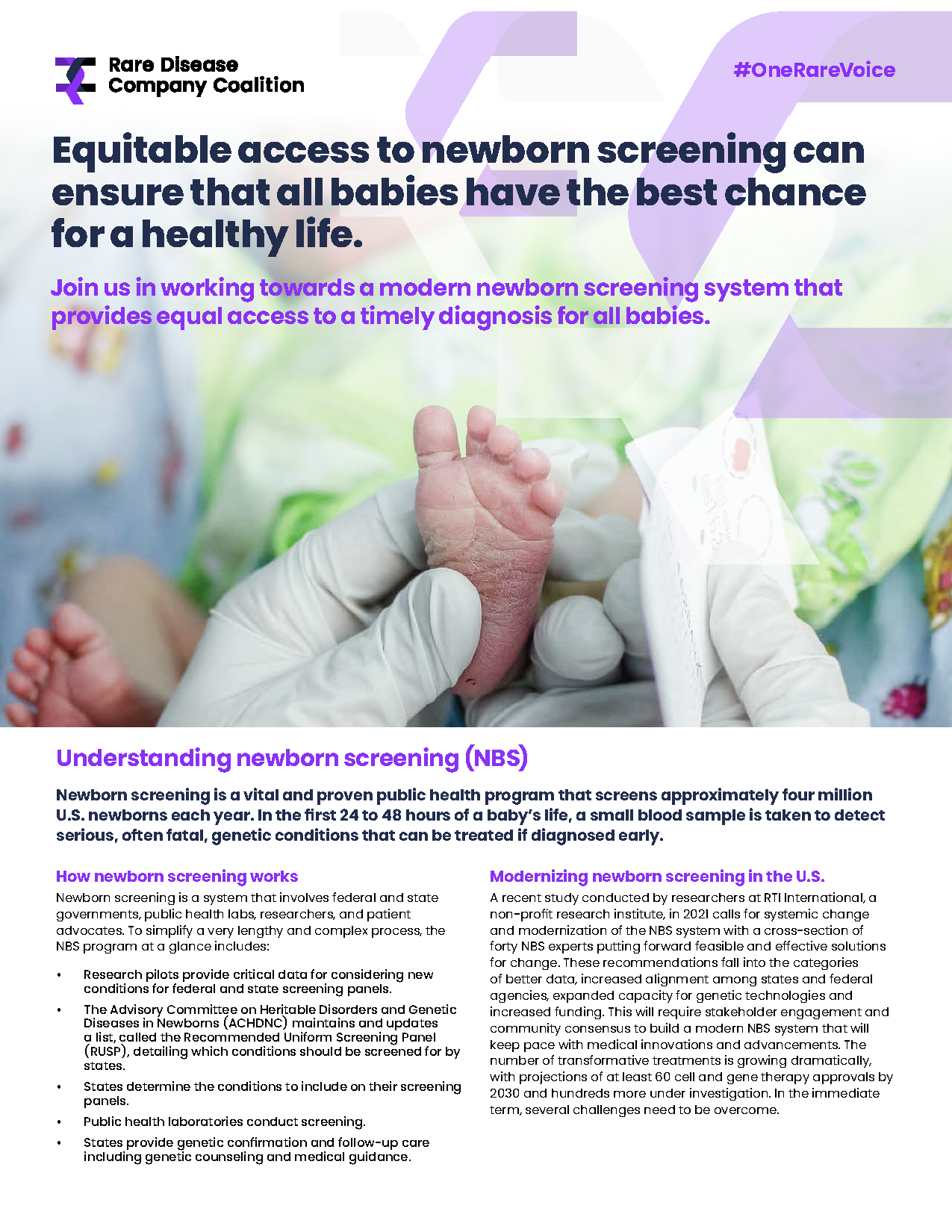
RDCC submitted comments to Board Members of the Colorado Prescription Drug Affordability Review Board (PDAP) concerning the impact a proposed rule could have on advancing research and development for new and innovative rare disease therapies. The Coalition asserted that the draft proposed rule as written could “in the long run harm more patients than it helps.”
In this letter, the RDCC strongly urges the PDAB to consider the unique circumstances of rare disease patients and therapies as it crafts its policy proposals, and cautions against punitive measures that would have an outsized impact on rare diseases. The impact of misguided policy proposals could stall future investment and development of rare disease treatments that would further disadvantage rare disease patients.
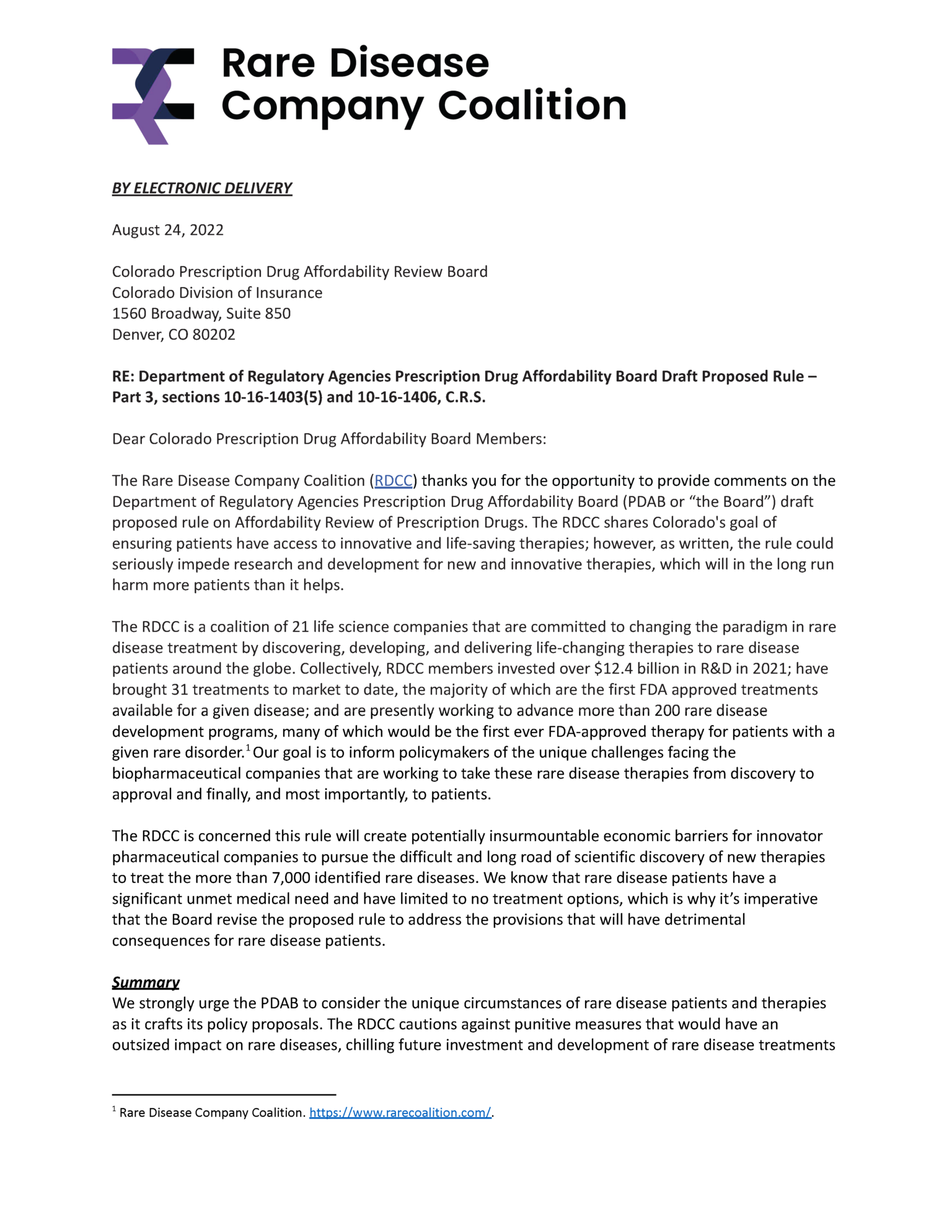
| A “one-size-fits-all” approach to drug pricing and value assessment frameworks undermines development of therapies for people – very often children – with rare diseases. As rare disease companies, we champion policies that help people with high unmet needs by developing innovative cutting-edge medicines and working with federal and state policymakers to address access and affordability. Learn more about the importance of restoring equity and patient focus when valuing rare disease treatments in this overview. |
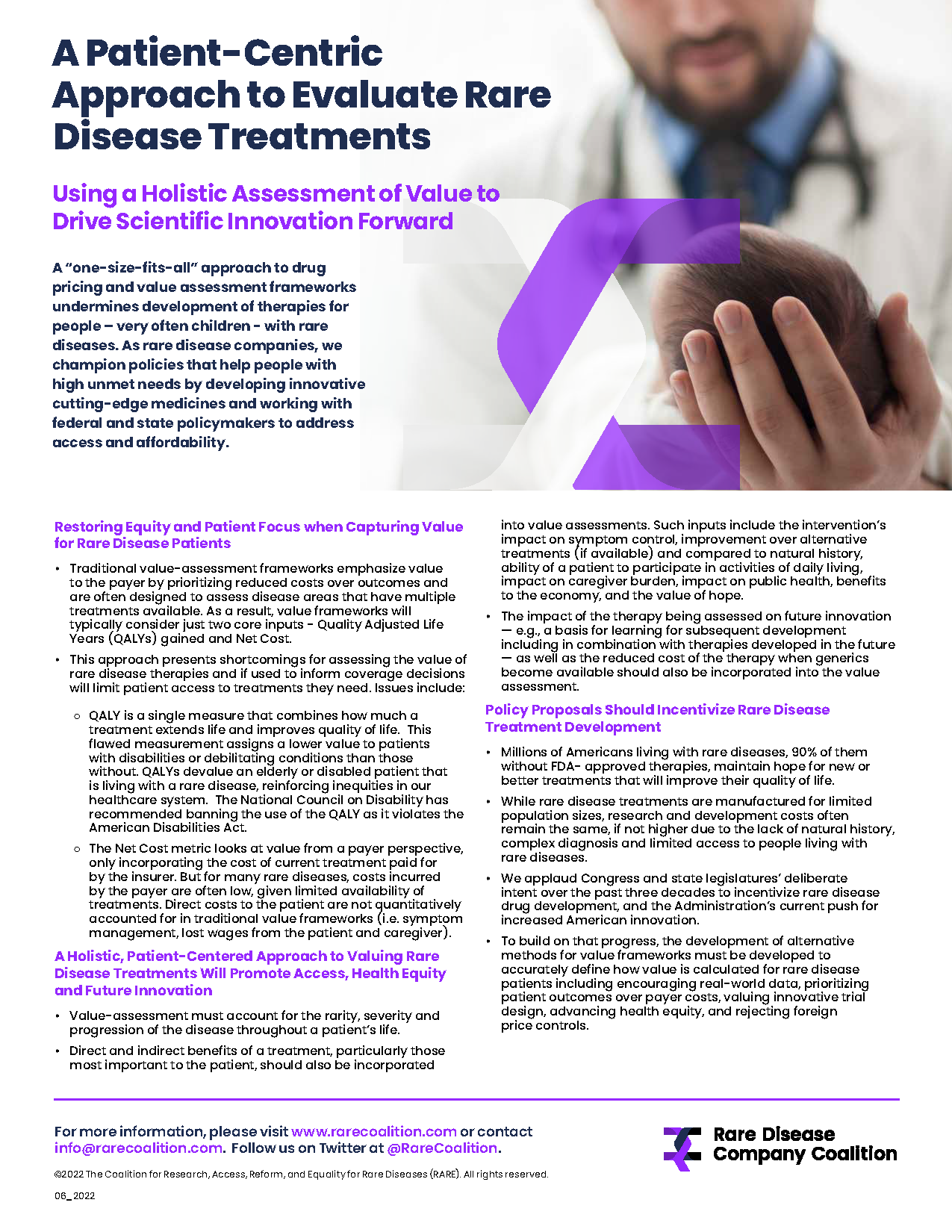
| The Orphan Drug Tax Credit is a vital lifeline for rare disease patients and should be protected to preserve hope for the rare disease community. Given that approximately 95% of rare diseases of rare diseases lack an FDA-approved drug, any proposal to reduce the ODTC would have a devastating impact on orphan drug development in the U.S. and on millions of Americans living with a rare disease. We must preserve innovation and not lose the gains that have been made since the passage of the ODA. Learn more about the Orphan Drug Tax Credit and its role in rare disease treatment development in this overview. |
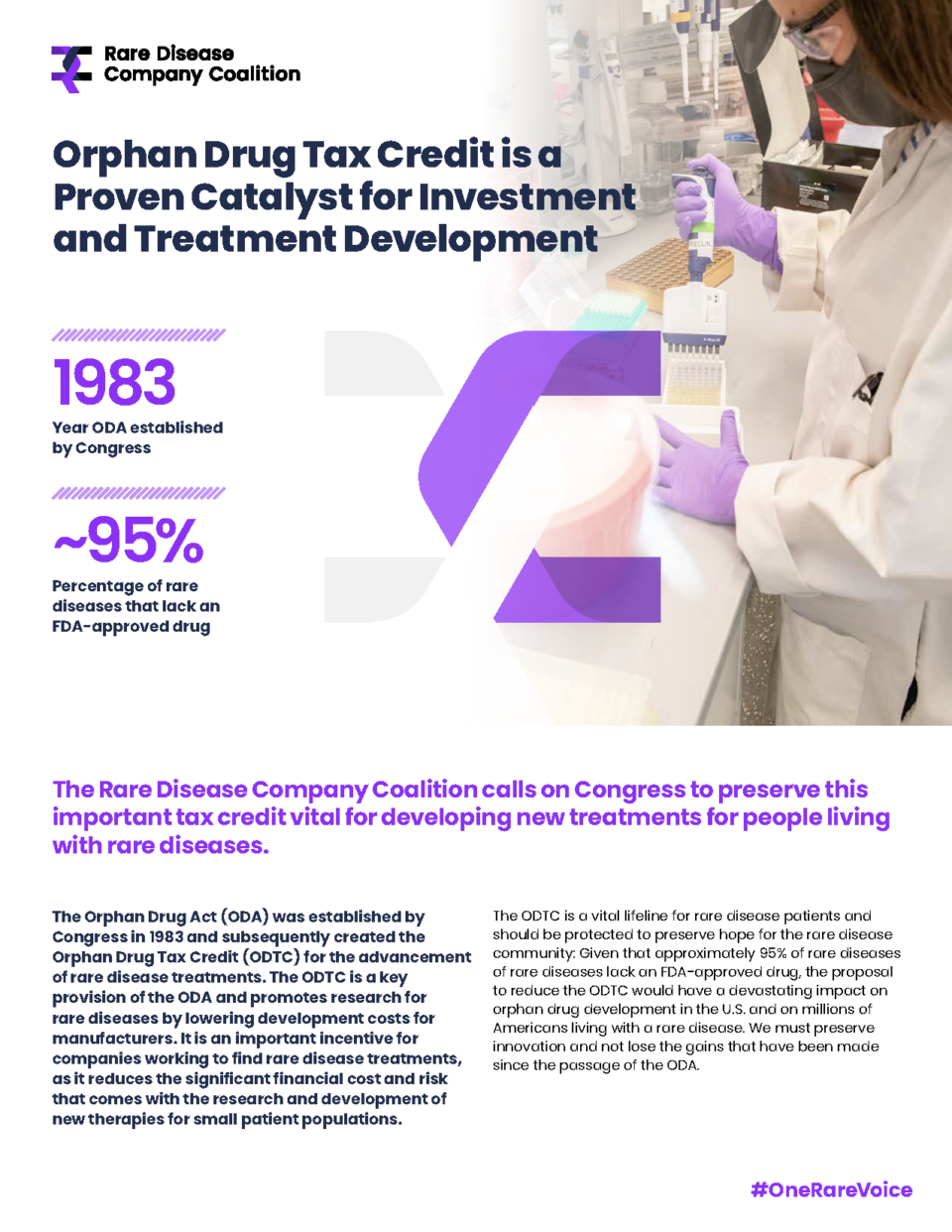
| FDA’s accelerated approval pathway recognizes that a “one-size-fits-all” traditional model cannot always work – especially for serious and unique rare diseases with very small population sizes that progress slowly and variably from patient to patient. Therapies approved through the accelerated approval pathway are subject to the same stringent, evidence-based clinical review and approval standards as the traditional FDA approval process, as well as to post-approval confirmatory trials to verify clinical benefit. While less than 10% of all accelerated approvals in its 30-year history have been used for nononcology rare diseases, today’s increased understanding of rare disease and advances in targeted drug development are making it possible to realize the promise of accelerated approval for rare diseases where current treatments don’t yet exist. As policymakers consider policy proposals that impact the trajectory of rare disease treatment development, we advocate for an approach that considers the unique circumstances of rare diseases and caution against punitive measures that could chill future investment and development of rare disease treatments. |
Click here to download this overview on the benefits of the accelerated approval pathway for rare diseases.
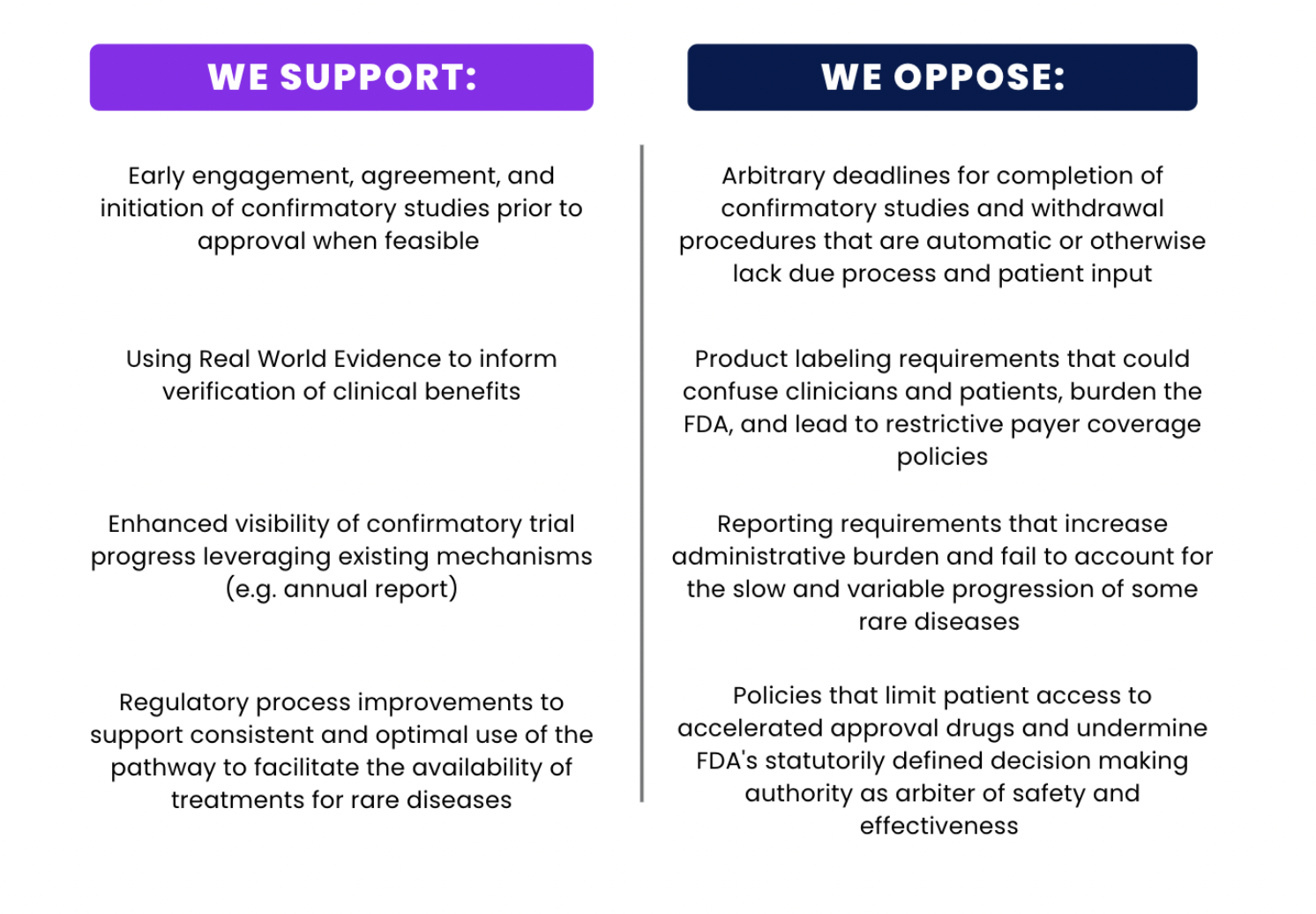
Building on our letter submitted to the Oregon Health Authority (OHA) on the proposed renewal and amendment of its Section 1115 waiver, RDCC submitted comments to the Department of Health and Human Services Secretary Becerra and Centers for Medicare and Medicaid Services (CMS) Administrator Brooks-LaSure on the OHA Section 1115 Demonstration Waiver. In this letter, the RDCC expresses concern with the potential impact that waiving certain provisions of Section 1927 of the Social Security Act would have on the discovery and development of new medicines, particularly on treatments and cures for patients with rare diseases who currently have limited or no treatment options.
Limiting Medicaid coverage for viable treatments would have a devastating impact on patients benefiting from this innovation and create a greater healthy equity divide, all while resulting in limited budget savings. This proposal is the wrong solution for patients.
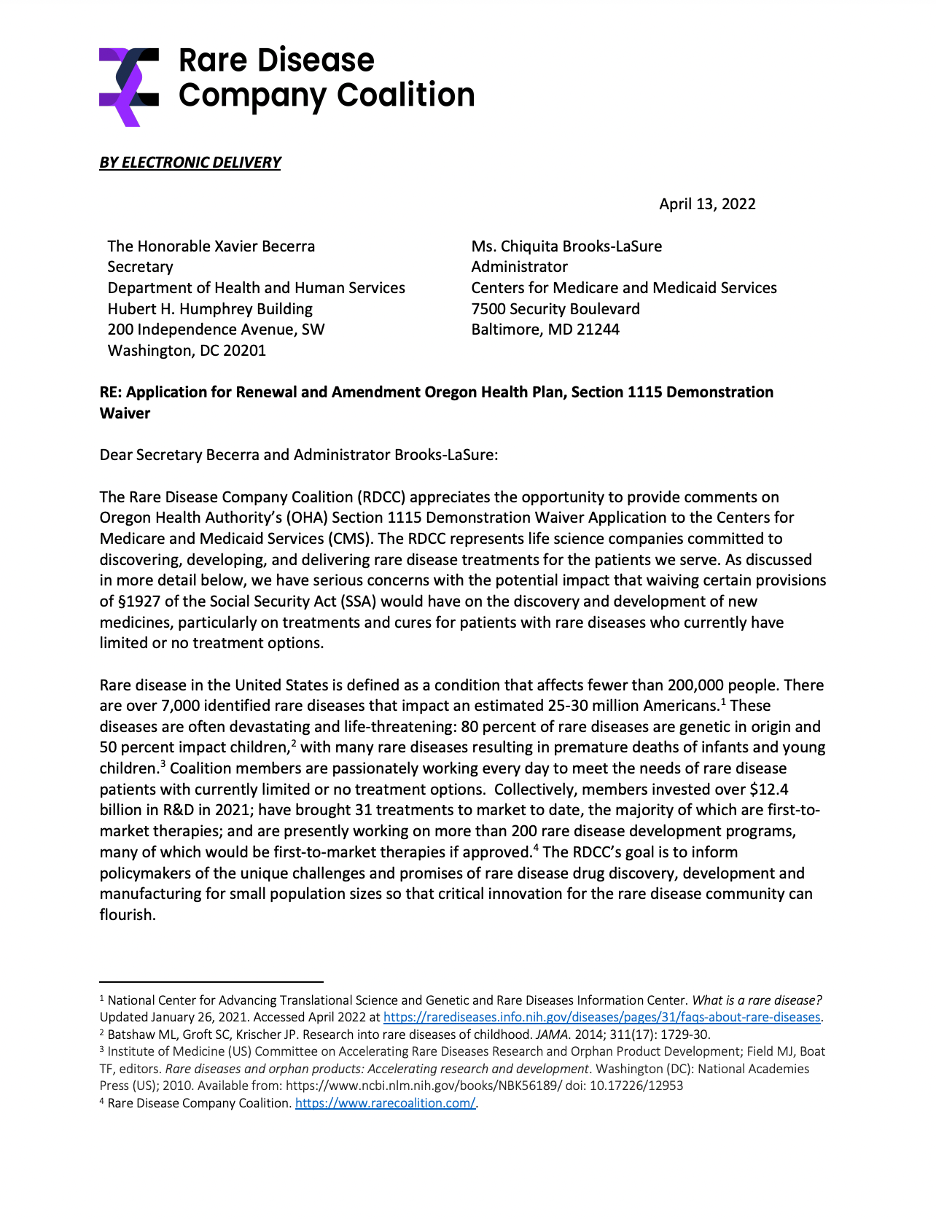
The Rare Disease Company Coalition (RDCC) is proud to support the bipartisan Better Empowerment Now To Enhance Framework And Improve Treatments (Benefit) Act (H.R. 4472 / S. 373). We applaud the work Congress has done to date to advance patient engagement in drug development and this legislation introduced by Representatives Doris Matsui (CA-6) and Brad Wenstrup (OH-2) and Senators Roger Wicker (R-MS) and Amy Klobuchar (D-MN) demonstrates a continued interest in doing so.
The BENEFIT Act addresses the need to reflect the patient perspective and experience in the FDA’s risk-assessment tool. This policy would play a critical role in the FDA evaluation and approval decision regarding drugs and other medical products and will allow the FDA to capture meaningful patient experience, PFDD, and related data as part of the benefit-risk assessment.
The RDCC believes this legislation will advance patient engagement, which ultimately can help advance the development and delivery of
treatments to those living with rare diseases. We applaud Rep. Matsui, Rep. Wenstrup, Sen. Wicker and Sen. Klobuchar for championing policies to improve the regulatory process and supporting the voice of the rare disease patients we serve.
Read our full endorsement letter here.
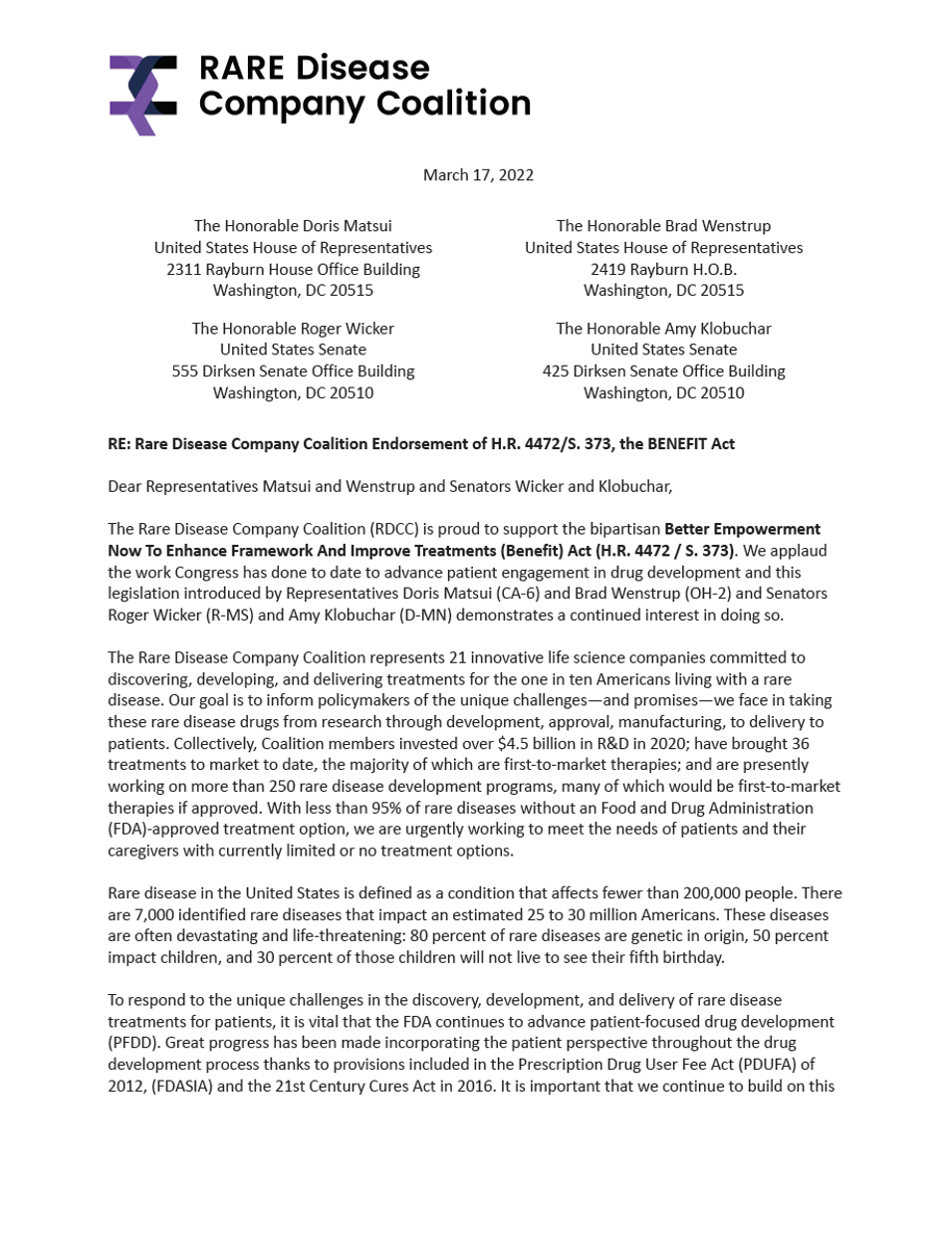
Click here to download an overview of our Policy Focus Areas.
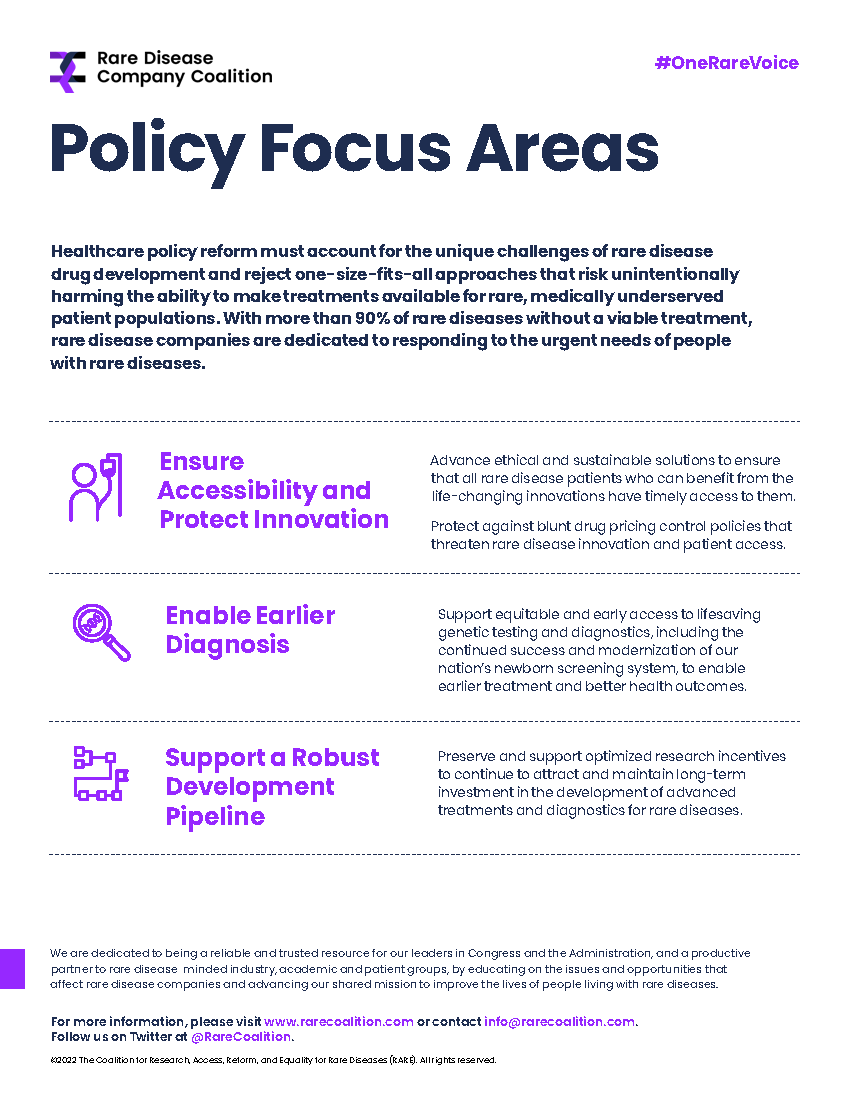
Earlier this month, our Coalition expressed concern to the Oregon Health Authority (OHA) on the proposed renewal and amendment of its Section 1115 waiver. We are a Coalition of biotech companies dedicated to the research, development and delivery of innovative treatments for rare diseases with over 225 rare disease development programs in process, we are deeply concerned about the impact of the proposed closed formulary provisions on the rare disease community. The proposal would limit coverage to one drug per therapeutic class and exclude drugs approved via the accelerated approval pathway. 93% of rare diseases do not have a single FDA approved treatment and limiting coverage for Medicaid beneficiaries that live with a rare disease jeopardizes patient health while threatening to curtail innovation.
We urge our Oregon-based partners, advocates, individuals living with rare diseases, and their caregivers to contact the Governor and their state legislators to voice their concern with this proposed amendment. Limiting Medicaid coverage for viable treatments would have a devastating impact on patients benefiting from this innovation and create a greater healthy equity divide, all while resulting in limited budget savings. This proposal is the wrong solution for patients.
Contact Information:
Governor Kate Brown
Submit comments online at: https://www.oregon.gov/gov/Pages/share-your-opinion.aspx
Call directly at (503) 378-4582
To find your state legislator, please visit https://www.oregonlegislature.gov/findyourlegislator/leg-districts.html
Click here to download the letter submitted from our Coalition to OHA on January 7, 2021.
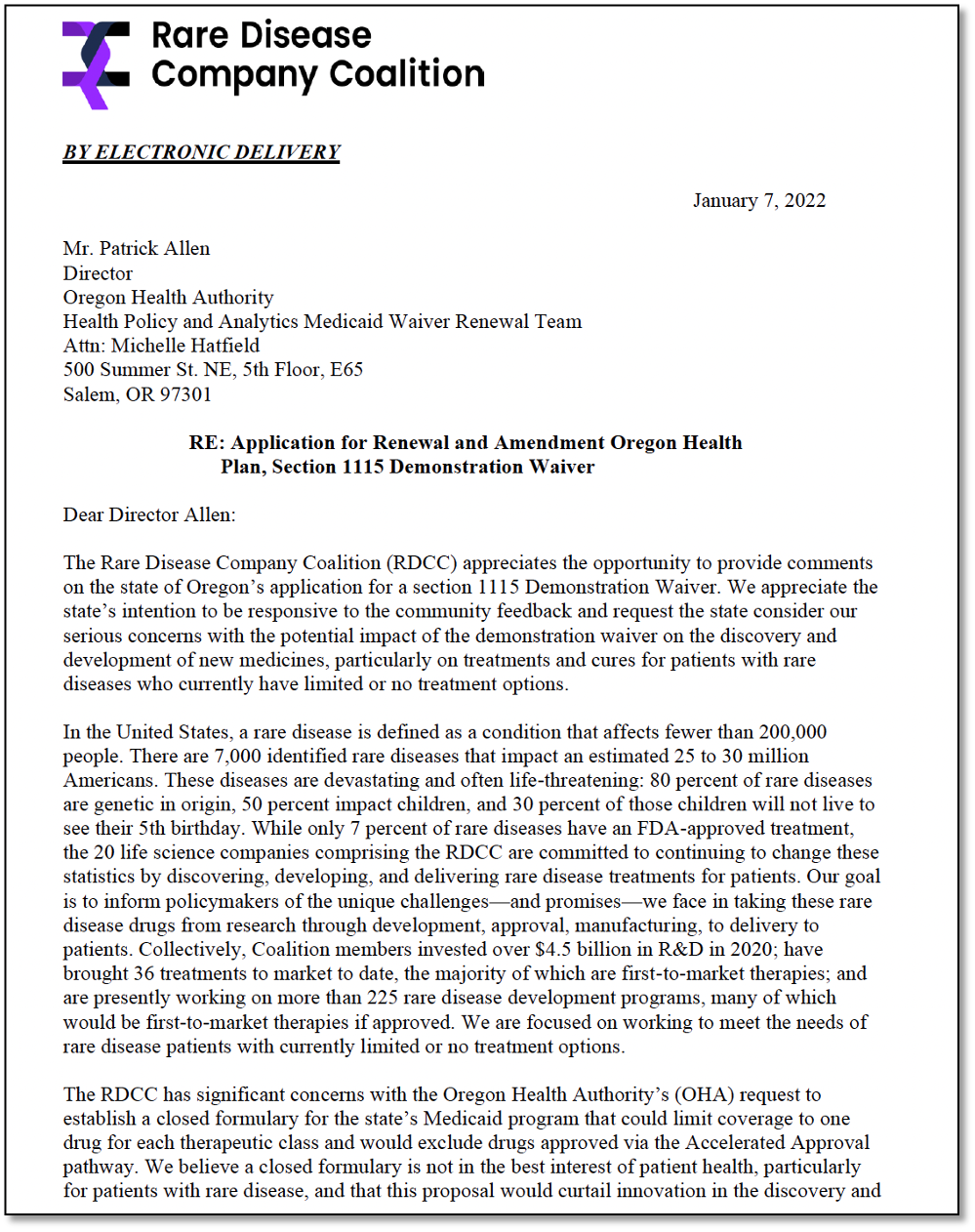
Watch this video to learn more about the unique challenges in rare disease treatment development, and why “one-size-fits-all” approaches to healthcare policy reform are harmful to continued investment and innovation for rare disease treatments.
Click here to download this overview.
